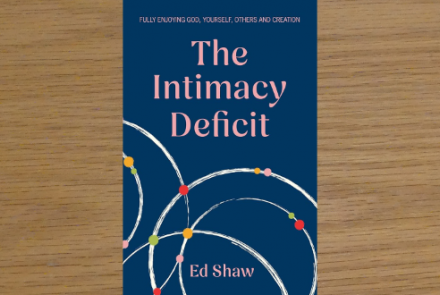Body and Mind both Reflect who we Are
In my original title for this article ("Is your body weighty?"), I was using the word “weighty” to mean important, rather than what the bathroom scales tell you in the morning! Elsewhere on our website, you will find articles where we have been thinking about gender, which needs to be rooted in a person’s natural sex (ie the maleness or femaleness that is apparent from the person’s body). This article considers our bodies more generally, starting by looking at some of the cultural trends that have left us disconnected from our bodies and then exploring the significance of our bodies and what they can tell us about ourselves.
Cultural trends
It is helpful to begin by exploring how recent changes in our society have affected how we view and experience our bodies, in contrast to how former generations might have seen them.
In the Internet age, we are increasingly disembodied, relating through screens and instant messages rather than by eye contact or by hearing the human voice. Many of us begin and end our days with our smartphones. We might give more regard to virtual approval than we do to the embraces or smiles of the people we encounter in person each day.
By contrast, in traditional forms of community made up largely of people quite different from us (such as family, neighbours, work colleagues and church members), there are generally enough people interacting with us who do not also have our particular issue (eg anorexia; gender dysphoria; same-sex attraction) that they can help us get our own issue in perspective, recognising it to be the exception rather than the norm. However, if we spend large amounts of our time and energy inhabiting Internet communities, it’s all too easy to construct our own society of people who mirror our own issue back to us, from which point it is a small step to see that issue as being the norm and the rest of society as a distant and hostile entity that opposes us. It is interesting that studies have shown that young people with autism, who can be prone to fixate on a single issue, are nearly 8 times more likely than the rest of the population to express a desire to adopt a gender identity in opposition to their biological sex (Gender Dysphoria and Autism Spectrum Disorder: A Systematic Review of the Literature, January 2016).
Another trend in our modern society is the constant re-fashioning of the body. Modern gyms are surrounded by mirrors – perhaps these are provided more to feed our desire to sculpt a certain appearance rather than to perfect our exercise technique. With over a trillion photos being taken every year worldwide, and many of them being shared widely on social media, our bodies are now exposed to levels of judgement that they have never experienced before. Increased levels of eating disorders and self-harming may be symptomatic of more and more people being discontent with the reality of their bodies. And activities like bodybuilding or cosmetic surgery encourage people to construct their bodies as they want them to be, rather than to accept their God-given-ness. So our bodies become objects of worship and disconnected from our real selves. Attempts to remodel the appearance of the body contrary to the person’s biological sex are particularly obvious outworkings of this trend.
Now I don’t want to portray a simplistic rose-tinted view of the past where everyone was always secure and happy with their bodies. However, I hope it is helpful to be aware of some of these trends, so that we can reflect on how we may have been influenced over recent years.
Mind vs body
So where have we got to as a society? We talk about being ‘connected’ through the Internet, but in reality we are left disconnected from our bodies which are our physical essence. In this section, we’ll explore where can I find the “real me” – in my felt experience or in my body?
In early life, every foetus or infant is deeply defined by its body: God formed each of us in our mother’s womb (Psalm 139:13). At that stage of development, every feeling or desire was expressed through the body. As we grew, our capacity to think and feel and articulate words and ideas developed, but we remained intimately connected to our bodies.
When a person expresses difficulty with integrating mind and body, this in itself is a testimony of the importance of the body - he or she finds it unbearable to inhabit a body that doesn’t feel like them. The rate of suicide and self-harm for young people with gender dysphoria is over eight times higher than their peers (Self-Harm and Suicidality in Children Referred for Gender Dysphoria, 2016), indicating (at least in part) how deeply distressing it is to experience our bodies as foreign vessels.
The body is a very personal part of a person. I know deep within that I am not just a “ghost inhabiting a corpse”. Some parts of the body are more expressive of a person’s identity than other parts. A body part such as my hand is perhaps fairly interchangeable with someone else’s hand because it is more geared towards performing a function rather than representing my individuality. But when people look upon my face, discerning my expressions and my individuality, they relate to me in a profoundly personal way. Have you ever had the experience of a stranger catching your eye, and finding yourself averting your gaze with embarrassment? Even a moment’s eye contact can be a deeply personal encounter.
So we do experience each other through the appearance of one another’s bodies. But let us also consider the other senses. The touch of another person’s body can show how deeply connected the body is to the person. A caress or a hug is much more than just a pleasurable sensation: it fulfils something of our deep need for intimacy and connection. And with our other senses we can experience the smells and the sounds of another person. There are no emojis that come near to experiencing or communicating these things. ;-)
Conclusions
In this article, I’ve explored how our online, image-hungry, individualistic society has left many of us out of touch with the reality of our bodies. I’ve also looked at how much our bodies speak to us and to others about who we are as people.
I hope I’ve inspired you here to unplug yourself a little bit more from your electronic devices, both habitually and emotionally, and to attend to how you might better inhabit your own body. If you struggle with how your body looks or functions, how about turning off the computer games and do something a bit more embodied? How about a bit of gardening or going for a run? Do something physical. Look someone in the eye and smile. It might feel good!
I am indebted to Dr Alastair Roberts for many of the ideas in this article – I wrote the article following a conversation with Alastair in July 2018. He is currently writing a book “Heirs Together: A Theology of the Sexes”, due to be published in October 2019.
This article was originally published in the Autumn 2018 "Ascend", the TFT magazine, under the title, "Is your body weighty?".






